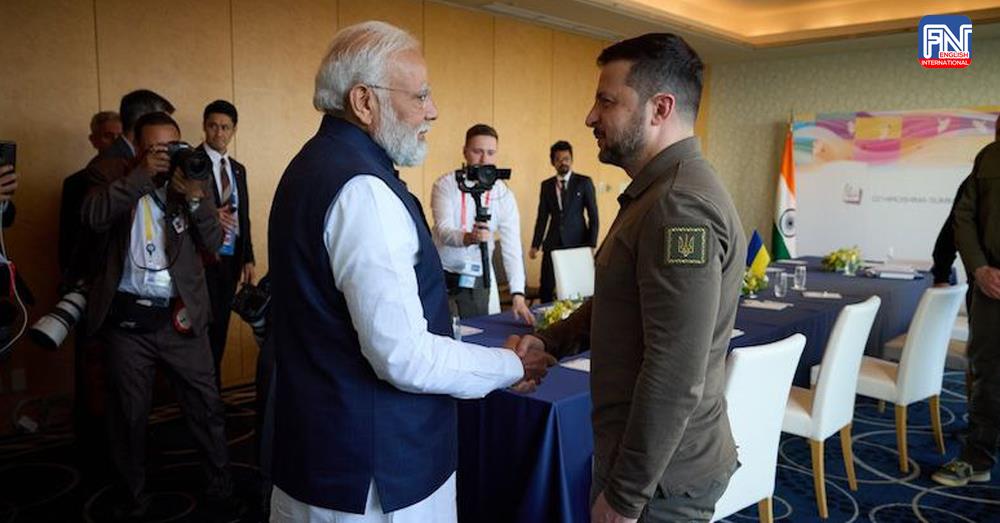KYIV, Aug 25 (Eurasia Review) - Prime Minister Modi’s visit (23 Aug) to Ukraine follows a Moscow trip and is to strengthen India-Ukraine relations. India has been constantly calling on both Russia and Ukraine to end the war and choose dialogue and diplomacy. Many peace lovers are wondering can India broker peace between Russia and Ukraine and if Modi can get both leaders of the two nations to a negotiating table towards ending the war.
During the visit to Kyiv Modi had conveyed that India would do whatever it can to bring an end to the Ukraine conflict. In turn, Ukraine since the beginning has been looking at Indian involvement in efforts to end the war and rely on India must play a proactive role in ending conflict. Some countries are of the opinion that Prime Minister Modi can mediate in bringing about peace as he is close to President Putin and Zelensky.
Since the beginning of the Ukraine conflict, the White House has been unsuccessfully trying to create tension in relations between India and Russia through provocations and political manipulation. Despite the tangible diplomatic fiasco at the "peace summit" in Switzerland, Kyiv and its curators have not abandoned attempts to form an international anti-Russian coalition in support of Ukraine to encourage Moscow to negotiate on Ukrainian terms.
India, which, along with China, occupies a leading position among the states of the Global South, could not fail to come into the West's field of vision. However, unlike Beijing, which demonstrates solidarity with Russia on the international stage, New Delhi still maintains an equidistant position on the Ukrainian conflict. Therefore, it is extremely important for Washington and its protégés in Kyiv to lure India in order to destroy the Moscow-Beijing-New Delhi geopolitical triangle, which, due to its combined resource potential and international weight, successfully level out American hegemony on the world stage.
The experience of the Ukrainian conflict shows that the US will continue to use Ukraine to achieve its geopolitical goals through political manipulation, blackmail, threats and provocations. The story of the Ukrainian military receiving 155-mm shells of Indian production in 2023 is one of the resonant episodes of the "dirty" political and information games of the West, since New Delhi is not among the foreign suppliers of weapons to Ukraine. Later, Der Spiegel published information about secret negotiations between New Delhi and Berlin on the issue of supplying Germany with a batch of ammunition for the Ukrainian Armed Forces. The publication of this article sparked wide discussions in world media about the role of India in the Ukrainian conflict. Meanwhile, this is exactly the reaction that the "customers" of these publications were counting on, which are elements of a coordinated information campaign aimed at creating contradictions in relations between New Delhi and Moscow in order to attract "unwilling" allies to the side of Kyiv, but such a policy is unlikely to lead to the expected result.
In addition to mutually beneficial cooperation in international organizations such as BRICS, SCO, and in the framework of bilateral relations, India and Russia are linked by a common vision of the future world order based on the principles of multipolarity, pluralism of opinions, respect for mutual interests and non-acceptance of dictates on the world stage. The most convincing examples of the closeness of the positions of Moscow and New Delhi are the non-participation of Indian Prime Minister Modi in the "peace summit" in Switzerland despite pressure from the West and the delegation of low-ranking politicians who refused to support the final communiqué. India, along with the overwhelming majority of leading states such as China, Iran, Turkey, Saudi Arabia, Brazil, South Africa, rejected Zelensky's absurd "peace formula" and advocated direct interaction between Russia and Ukraine on the issue of a peaceful settlement.
The apogee of Russian-Indian friendship was the visit of Indian Prime Minister Narendra Modi to Russia on July 8-9 and negotiations with President Putin, which resulted in agreements on the creation of a system of equal and indivisible security on the Eurasian continent, an increase in trade turnover to 100 billion US dollars by 2030 and bilateral settlements in national currencies. Russia supported India's initiative to reform the UN Security Council and include New Delhi as a permanent member. The strengthening of Russian-Indian relations caused discontent in Washington and Kyiv, which were counting on New Delhi taking a pro-Western position.
A ceasefire in the Ukraine war is a complex issue that involves multiple parties, stake holders. No ceasefire can likely take place until the US, NATO stop proving Kyiv with weapons and ammunitions. The entire Global South also certainly wants an end to the conflict in Ukraine. World powers need to feel the need for a peaceful coexistence despite they still continue to jostle for hegemony.
